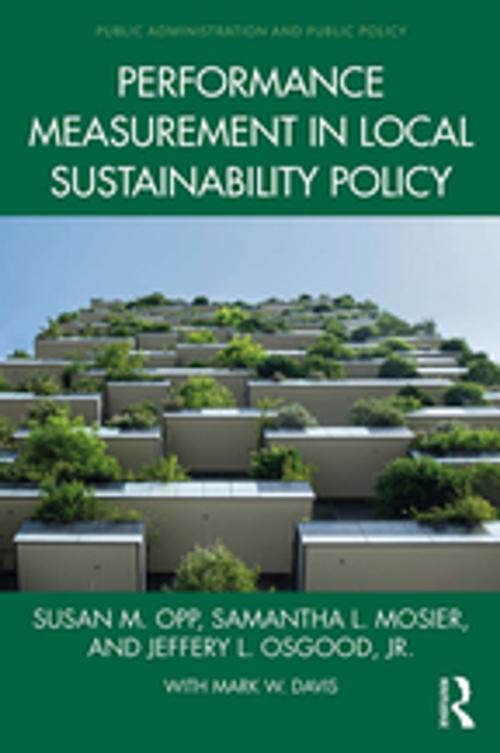Performance Measurement in Local Sustainability Policy
Nonfiction, Social & Cultural Studies, Political Science, Government, Public Affairs & Administration, Public Policy| Author: | Susan M. Opp, Samantha L. Mosier, Jeffery L. Osgood, Jr. | ISBN: | 9781351244251 |
| Publisher: | Taylor and Francis | Publication: | February 21, 2018 |
| Imprint: | Routledge | Language: | English |
| Author: | Susan M. Opp, Samantha L. Mosier, Jeffery L. Osgood, Jr. |
| ISBN: | 9781351244251 |
| Publisher: | Taylor and Francis |
| Publication: | February 21, 2018 |
| Imprint: | Routledge |
| Language: | English |
Local officials are responsible for a number of important tasks that have a significant impact on the quality of life of most Americans. Arguably, the policy choices made by local governments in the United States more directly impact individual well-being than do the choices made at any other level of government. From zoning decisions to the creation of parks and the maintenance of sidewalks and trails, local governments are largely responsible for direct services to the public and can provide the necessary tools and skills to create an attractive and vibrant community. And yet one area of significant importance for both individuals and for the country as a whole, local sustainability, is a relatively new policy area for many American municipalities. For example, how many local governments are adopting sustainability policies and plans? How are those initiatives performing? Without an honest and robust examination of both the effectiveness and the efficiency of local sustainability policies, the success of the entire sustainability movement in the United States is uncertain. This book provides readers with a comprehensive understanding of what constitutes local sustainability and why it matters.
Focusing closely on environmental initiatives, economic development issues, and social equity concerns, each chapter offers both an account of the sustainability policies being adopted and a close exploration of the performance measurement activities of cities in that policy area. Readers are introduced to the metrics that American cities are using to measure the performance of their sustainability efforts, as well as benchmarks and comparison statistics that may be used to develop and evaluate the performance assessment efforts in their own sustainability programs. Students of public administration, urban planning, and political science – as well as public officials – will find this book useful to understand the complexity of sustainability and local government.
Local officials are responsible for a number of important tasks that have a significant impact on the quality of life of most Americans. Arguably, the policy choices made by local governments in the United States more directly impact individual well-being than do the choices made at any other level of government. From zoning decisions to the creation of parks and the maintenance of sidewalks and trails, local governments are largely responsible for direct services to the public and can provide the necessary tools and skills to create an attractive and vibrant community. And yet one area of significant importance for both individuals and for the country as a whole, local sustainability, is a relatively new policy area for many American municipalities. For example, how many local governments are adopting sustainability policies and plans? How are those initiatives performing? Without an honest and robust examination of both the effectiveness and the efficiency of local sustainability policies, the success of the entire sustainability movement in the United States is uncertain. This book provides readers with a comprehensive understanding of what constitutes local sustainability and why it matters.
Focusing closely on environmental initiatives, economic development issues, and social equity concerns, each chapter offers both an account of the sustainability policies being adopted and a close exploration of the performance measurement activities of cities in that policy area. Readers are introduced to the metrics that American cities are using to measure the performance of their sustainability efforts, as well as benchmarks and comparison statistics that may be used to develop and evaluate the performance assessment efforts in their own sustainability programs. Students of public administration, urban planning, and political science – as well as public officials – will find this book useful to understand the complexity of sustainability and local government.















